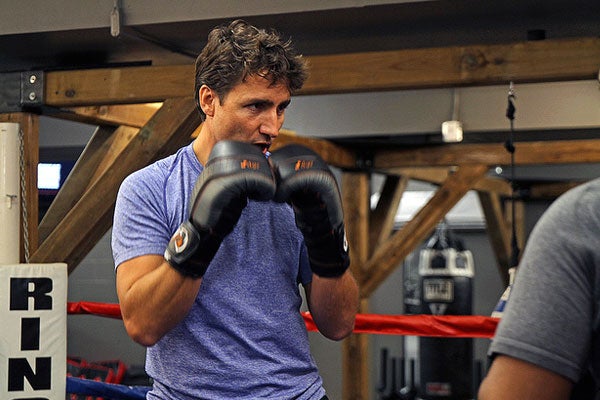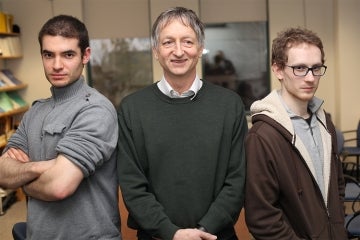
U of T experts on what's next for Canada's international reputation
Published: October 22, 2015
Having the world’s media fawning and gawking over Canada’s newly elected prime minister isn’t necessarily a bad thing, says Hugh Segal.
And that's particularly true at a time when Canada’s international reputation has been called into question, the Master of Massey College and former member of the Senate said in an interview this week.
“Any time a modern industrial democracy elects a leader who acquires a star standing around the world very quickly, that is a tremendous plus for Canada,” said Segal. “It’s an instrument he can use because of the interest in his new role as prime minister to shape some perceptions of our foreign policy and our priorities in a way that might not have existed for his predecessor. I think it’s a good thing, not a bad thing.”
How Canada can re-assert its influence on the world stage will be up for discussion on Oct. 22 when U of T’s Canadian Centre for the Responsibility to Protect organizes a roundtable featuring Jennifer Welsh, the U.N. Secretary General’s special adviser on the responsibility to protect, along with Professor Stephen Toope, director of U of T’s Munk School of Global Affairs, Marius Grinius, former Canadian ambassador to South Korea and permanent representative to the UN and Segal.
The event, which will lead discussion on both Canada’s foreign policy and the UN’s responsibility to protect principle, will be held from noon to 2 p.m. at the Munk School of Global Affairs. Register for the event here.
The erosion of Canada’s international reputation was the subject of internal reports by senior Foreign Affairs officials leaked in the final weeks before this week’s election. The reports identified climate change, building stronger democracies and engaging the United Nations as key areas where Canada’s influence has dwindled. And the Harper government was criticized at length for distrust of its foreign service, selling off embassies abroad and for hurting Canada’s reputation by backing military action rather than diplomacy. They called for a post-election focus on improving the country’s image.
Along with fixing the country’s economy and uniting the country, that’s one of the critical challenges ahead for Trudeau, said Segal.
“I think the prime minister – because of global interest in his election and because of the reputation that the other Prime Minister Trudeau had – has a rare opportunity for Canada to reset international expectations and lay out some compelling priorities which will make it perfectly clear that Canada will be an engaged participant in the critical issues facing our allies and the international community.”
 As he builds a cabinet, Trudeau must choose a foreign minister. Both Segal, who chaired the Senate’s committees on Foreign Affairs and Terrorism until 2014 and was appointed recently by Harper to co-chair an advisory committee on public service, and Munk School Professor Robert Bothwell, who has been vocal in his criticism of Harper’s foreign policy and poor relationship with U.S. President Barack Obama, suggested former astronaut Marc Garneau (at centre of photo by NASA).
As he builds a cabinet, Trudeau must choose a foreign minister. Both Segal, who chaired the Senate’s committees on Foreign Affairs and Terrorism until 2014 and was appointed recently by Harper to co-chair an advisory committee on public service, and Munk School Professor Robert Bothwell, who has been vocal in his criticism of Harper’s foreign policy and poor relationship with U.S. President Barack Obama, suggested former astronaut Marc Garneau (at centre of photo by NASA).
“I very much hope that Trudeau will pick a foreign minister who is capable of repairing morale and giving new and rational direction to the department,” Bothwell said. “These are housekeeping tasks, perhaps, but if we don’t do them we will have no house to keep. The name of Marc Garneau is frequently mentioned, and in my opinion he would be an excellent choice.”
Segal calls for Trudeau to order a review of Canada’s foreign policy “to signal to the world and many groups of Canadians like NGOs that the government is looking for input in a way that could be very instructive.”
Both professors point to important meetings and summits ahead: When Trudeau meets with Commonwealth leaders in early November in Malta as they choose a new secretary general, Segal says Trudeau should take a strong position in support of reform and modernization of Commonwealth especially on issues like development, education, rule of law and democracy. En route, he will likely be going through the United Kingdom to pay his respect to the Queen and have some initial discussions with the British Prime Minister to talk about Afghanistan and Iran, and work at building relations.
Bothwell says the forthcoming UN Conference on Climate Change in Paris is another opportunity to show change.
“It will be a very high profile occasion and an ideal forum for showing that Canada is no longer AWOL from international cooperation,” Bothwell said.
The event will be held at Room 108N at the Munk School of Global Affairs. It is co-sponsored by the Canadian studies program at University College, the international relations program at Trinity College, the Bill Graham Centre for Contemporary International History, the Centre for the Study of Korea at Asian Institute, the Munk School of Global Affairs and the International Relations Society.



